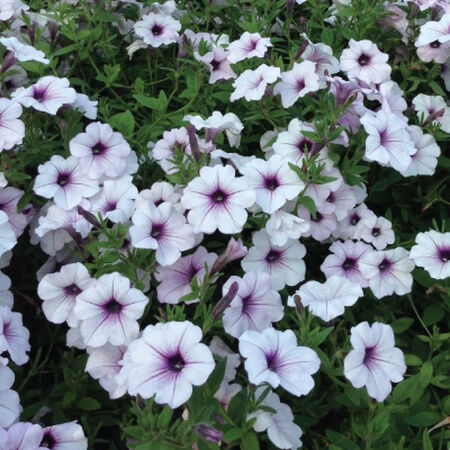Tidal Wave Silver, Petunia Seeds
Key Attributes
Key Attributes
Product Details
Weight
0.008Depth
0.1Height
4.5Width
3.25Plant Height
6-12"Botanical Name
Petunia x hybridaSeed Type
SeedAdditional Characteristics
All American SelectionPacket
10 SeedsSow Depth
1/8"Breed
F1 HybridSun
Full SunGrowing Conditions
Container Friendly, Hanging BasketsLife Cycle
AnnualSow Method
TransplantCategories
FlowersDays To Maturity (# Days)
65Components
Growing Instructions
![]() Learning Download: How to Grow Petunias
Learning Download: How to Grow Petunias
Petunias are one of the most popular flowers to grow in America, and the flower has a wide variety of uses. Petunias are a popular flower to grow from seed because many garden centers only sell a few different kinds of already sprouted plants.
Before Planting: Petunia seeds should be started indoors up to 10 weeks before the last frost.
Planting: Once seedlings have two sets of true leaves, transplant them into individual pots. Keep them under lights indoors until it’s time to transplant them. After the last frost, transplant the seedlings to the garden.
Watering: Petunias require frequent watering as their roots are shallow and dry out quickly.
Fertilizer: Once seedlings are transplanted, sprinkle a teaspoon of an all-purpose, granular fertilizer around the base of each plant.
Days to Maturity: Petunias will bloom all spring until fall.
Harvesting: The seed pod is ready when it turns brown and begins to crack. Cut the seed pod off the stem and spread the pods in a single layer on a paper towel. Place in a cool, dry place for a week to allow for the seeds to dry. Break the pods open after a week and place the seeds in an envelop to keep until planting.
Tips: By the midsummer, the plants may begin to get leggy. To prevent this, cut each stem back by half.
Shipping Schedule
Our Seed Promise
 "Agriculture and seeds" provide the basis upon which our lives depend. We must protect this foundation as a safe and genetically stable source for future generations. For the benefit of all farmers, gardeners and consumers who want an alternative, we pledge that we do not knowingly buy or sell genetically engineered seeds or plants.
"Agriculture and seeds" provide the basis upon which our lives depend. We must protect this foundation as a safe and genetically stable source for future generations. For the benefit of all farmers, gardeners and consumers who want an alternative, we pledge that we do not knowingly buy or sell genetically engineered seeds or plants.
The mechanical transfer of genetic material outside of natural reproductive methods and between genera, families or kingdoms, poses great biological risks as well as economic, political, and cultural threats. We feel that genetically engineered varieties have been insufficiently tested prior to public release. More research and testing is necessary to further assess the potential risks of genetically engineered seeds. Further, we wish to support agricultural progress that leads to healthier soils, to genetically diverse agricultural ecosystems, and ultimately to healthy people and communities.
To learn more about the "Safe Seed Pledge" please visit www.councilforresponsiblegenetics.org.

